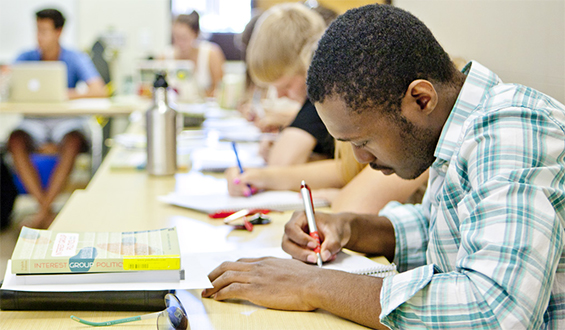
The Organization for Economic Cooperation and Development (OECD) has released a report on the data from the internationally administered Programme for International Student Assessment (PISA) in which international scores in core subjects are analyzed.
“Low Performing Students: Why They Fall Behind and How To Help Them Succeed” analyzes data from students in 64 countries who were tested on reading, math, and science in 2012. It also compares their scores to those achieved in 2003 on the same test and measures improvements.
The test is intended to score students on the basic skills needed to find and keep a job, and failures bode ill for both the individual student and the economy in which those students are expected to participate.
According to Natasha Bita of the Australian, the report sets a benchmark for a country’s educational foundation:
This report sets the bar at a very basic level of performance that we should expect all young people in the 21st century to attain.
Students who perform poorly at age 15 face a high risk of dropping out of school altogether; and when a large share of the population lacks basic skills, a country’s long-term economic growth is severely compromised.
More than a quarter of 15-year-olds in economically developed countries – about 13 million children – do not measure up to basic standards in at least one of the three core subjects. In some countries, the problem affects more than half of the students.
The OECD found that students are more likely to score badly in math if they are socioeconomically disadvantaged, are female, have an immigrant background, speak a different language at home than is spoken in the classroom, have a single parent, live in a rural area, did not attend preschool, have repeated a grade, or have enrolled in a vocational program.
China scored the best out of all of the countries, with Estonia, Hong Kong, and Korea following close behind.
According to Lauren Camera of US News, 26% of students in the United States performed poorly in math. 17% had reading skills below expected and 18% scored poorly in science. 41% of disadvantaged students performed poorly in math, compared to 9% of advantaged students.
Josie Gurney-Read of the Telegraph reports statistics from the UK’s results, where poor math scores have brought attention to a lack of qualified math teachers. More than one-fifth of students scored badly in math, possibly due to a lack of teachers specializing in math.
Ireland, however, measured up relatively well, according to Carl O’Brien of the Irish Times, with only 17% of students performing poorly in math, 10% struggling with reading, and 11% showing difficulty with science. Ireland was ranked 17th overall.
What is the solution to poor or declining scores in these core subjects? According to the Agence France Presse, the report reads:
It is education policy and practice that can help students clear this bar, not just per capita income.
The OECD recommends that countries lagging behind could improve students’ performance by providing remedial support as early as possible, identifying low-performing schools and boosting their funding, and creating special programs for minority-language students, reports Phys.org.
However, parental support and involvement may make more of a difference than any national policy could achieve.




